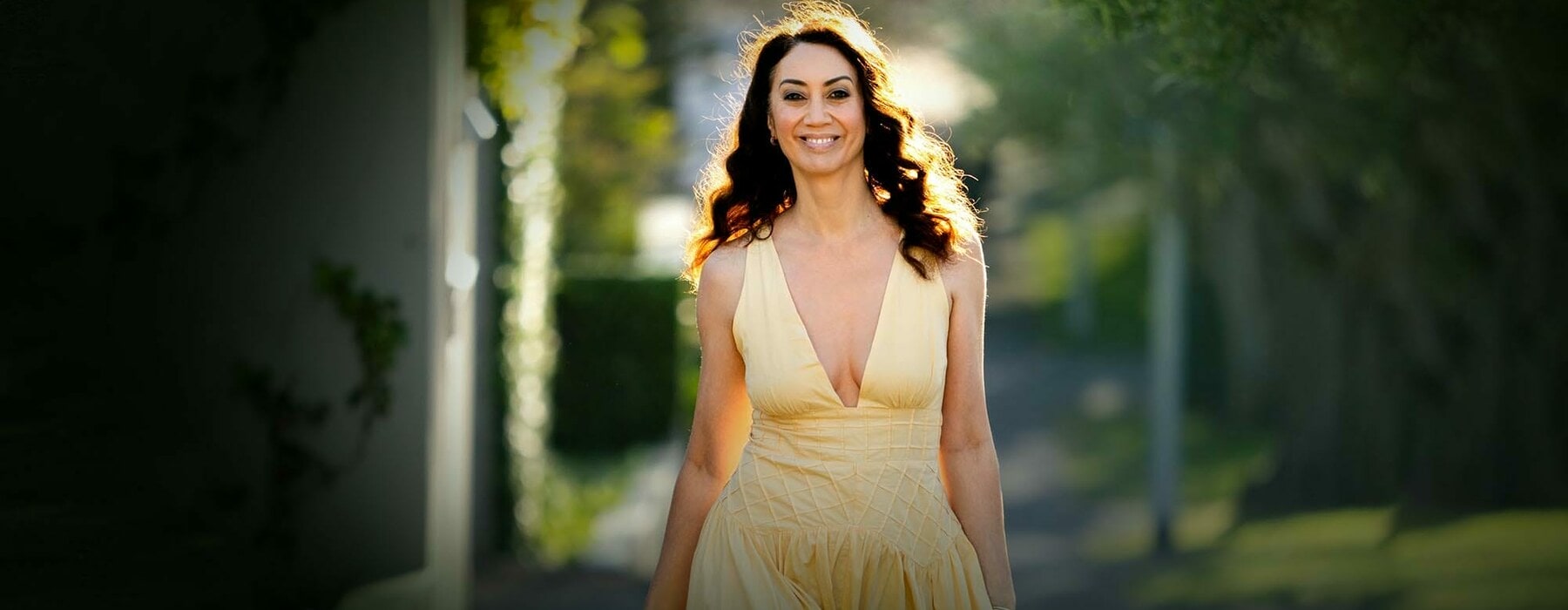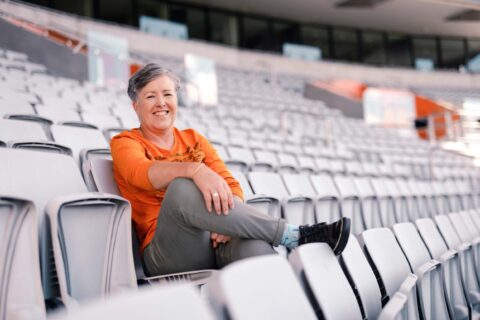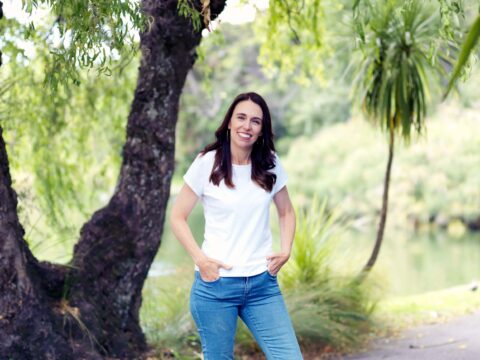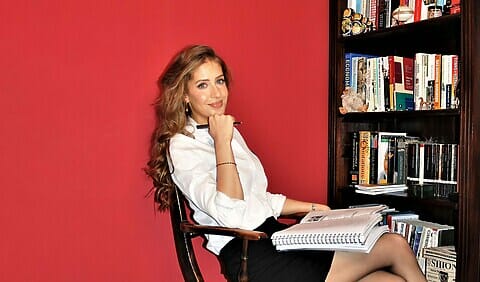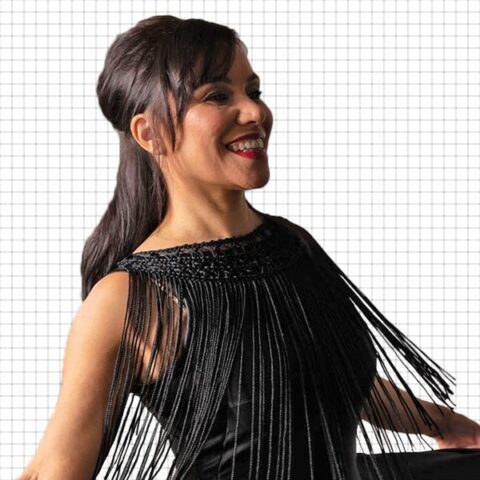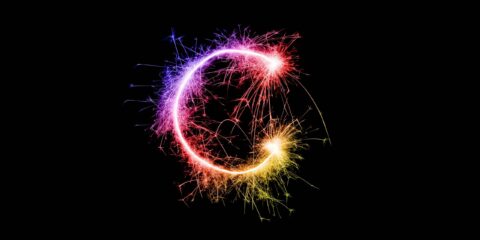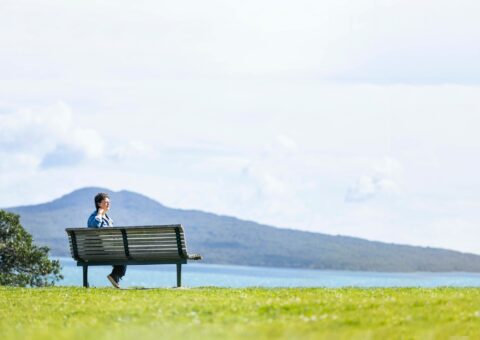Joining a community of eco-warriors has helped broadcaster Miriama Kamo overcome paralysing anxiety about the state of the planet. She tells Fiona Barber about her zero-waste wins, her second-hand shopping superpower and why she’s looking forward to turning 50.
You won’t find slick, shiny minimalism in Miriama Kamo’s home. Nor is it part of her life. When you walk into her Auckland villa, it’s busy – people, dogs, art, pre-loved and worn furniture, and a line of goods along the hallway ready to be given away or recycled. It’s just the way she likes it – for her peace of mind and for the planet.
“I grew up in a big, chaotic house,” says the long-time broadcast journalist and presenter of theTVNZ current affairs show, Sunday. “I have four siblings. My mother came from a family of 10; my father’s parents always had a full house.”
Her place, which she and husband Mike Dreaver bought about 15 years ago and then lifted and extended, is currently home to five – the couple, plus kids Sam, 22, Te Rerehua, 11, and Miriama’s 19-year-old niece, Elan, as well as dogs Flo and Luna.
It’s a study in homely, cosy chic, although she doesn’t describe it that way. “My aesthetic is: everything seems to work in its chaos.”
No sign of mayhem here, however. Just the used, the worn and the loved that knit together cohesively, despite their varied origins. The dining chairs, for example, were bought second-hand from a restaurant, and she says, pointing to a stack of mismatched tableware, “Those are our good plates.”
The couch has also seen better days. “It’s ripped. It’s in a terrible state. I cover it with blankets. If I did buy a new one, it’d be second-hand, and I’d give this one away. I do admire minimalism, but I can’t live that way. Nothing here is precious. Everything has to be lived on, jumped on. The scribbles on the wall… They’re part of the story of this house.”
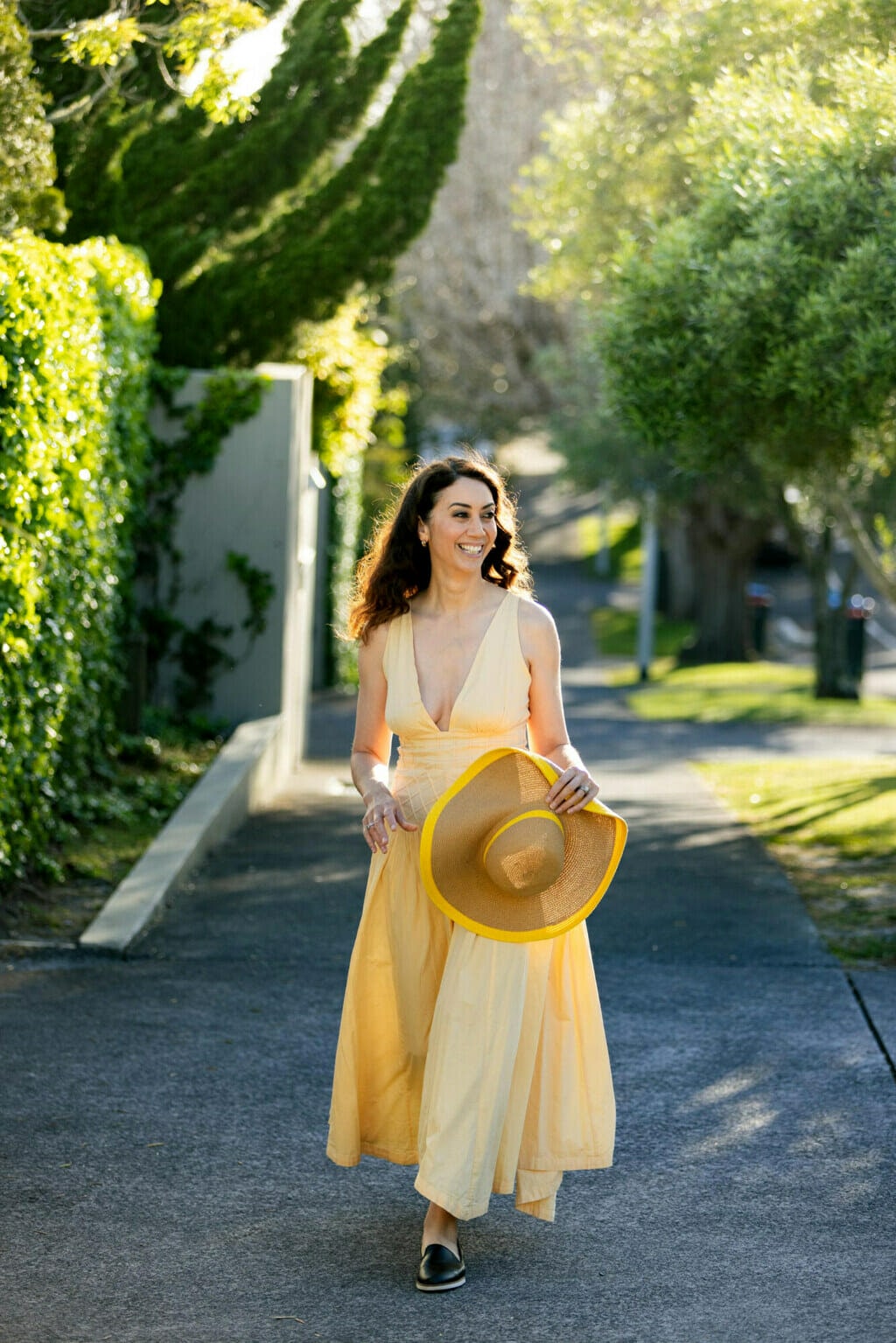
When Thrive visits, Miriama is stylishly kitted out in recycled clothes, not that you’d know it. There are only two exceptions to her rule of buying pre-loved pieces. She occasionally splashes out on new clothes from local designers (“I don’t want my second-hand journey to exclude amazing local artisans”) and shoes (“Unfortunately, I have giant feet and I have to buy new”).
She’s very good at snaring treasures. “If I have a superpower, it’s finding cool things online. I start with, ‘What do I need?’ not ‘What do I want?’”
What’s in Miriama’s home is an illustration of her world view and, as she has discovered, inextricably linked to her wellbeing.
She started out on a zero-waste journey in 2018 as a New Year’s challenge to herself, but it has grown into a way of life. It’s also had an unexpectedly positive effect on her health and outlook. She once suffered from deep anxiety about the state of the planet. “I used to despair. What about my children? Their children?”
Once she started down the zero-waste route, however, that began to dissipate. She became connected to like-minded people, “a community of eco-warriors”, who have also helped to alleviate the fear. “I feel empowered. I can make changes. I don’t want to go back,” she says, as she sips green tea and strokes 14-year-old Flo, a tiny and vociferous papillon-shih-tzu-silky-terrier cross, perched on her lap. “I don’t want to be anxious and not take action.”
She’s at pains to explain that the journey is a learning one, and that she and her family are far from perfect. “Every day there is at least one fail.” But the challenge has given her surprising joy and her hope has been replenished.
“Whatever remnants of fear [remain], I feel like I’ll have it figured out by the time I’m 50 [next year], and not be a frightened person. We are in a scary time, but we won’t survive by being frightened. When I realised the Earth will endure, I felt this sense of opportunity. I have enormous gratitude for the planet when we do so much to make its job so difficult. We should be giving back to it, so it keeps well.”
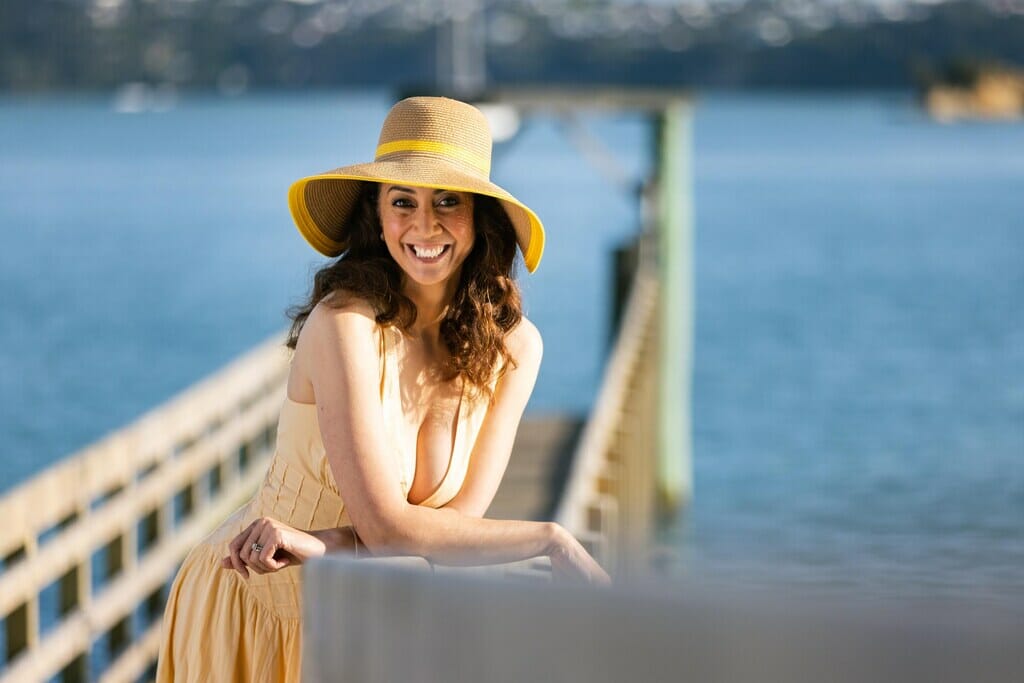
I dare you
Another challenge that’s had a profound effect on her wellbeing dates back to November 2020, when daughter Te Rerehua dared her to stick to a plant-based diet for a month. Within 10 days, Miriama’s long-term back pain waned. “Now I can exercise, and I ride an electric bike,” she says. (An early adopter of e-bikes, she has all the necessary kit and says she doesn’t give toss how she looks.)
So successful was the plant-based experiment that, by and large, that’s the way she still eats. As well as avoiding red meat, she doesn’t consume sugar. “Salmon is something that I have when I need comfort food. It’s my all-time favourite. Oh, and I like fried food.”
She admits she’s no great shakes as a chef (“stir-fries and boil-ups”) or a host (“Here’s the kitchen, help yourself”). “Mike’s the great chef; I’m the eater.” One of his specialties is chilli eggplant spaghetti, while Sam can turn his hand to a roast or a slow-cooker meal.
Miriama has another “ridiculous challenge” on the go. It’s a cold blast of water at the end of the shower. Cold water is said to constrict the blood vessels, reducing blood flow and helping to reduce inflammation and swelling.
“I’ve worked up to seven seconds. Everything is about reducing inflammation. My [late] dad had dementia, so I want to preserve my brain cells, and avoid back pain. Everything is about preservation. Including the planet.”
She’s also unapologetically open about her life stage, which has thrown up a few unexpected surprises. For one, the anxiety. “I’d done lots of stories about menopause, about hot flushes, all the normal things, but I didn’t know about anxiety and forgetfulness,” she says. At first, she took a natural approach to menopause, as is her way, but ended up taking prescribed treatment. “I have a great respect for conventional medicine.”
She’s adamant this part of women’s lives is something that should be out in the open: “I’m really happy to talk about menopause,” which sits within her four essential M words: menstruation, miscarriage, motherhood and menopause.”
Star power
For Miriama, the tumult of the past few Covid years was exacerbated by the death of her dad, Raynol Kamo, on the first day of lockdown in August 2021. Because of the timing, she
had to watch his tangi online. It became part of a Sunday story, in which the award-winning journalist highlighted the heartache of losing and mourning loved ones during Covid restrictions.
Part of her healing was a dedication to her father in the back of Matariki, one of the children’s books she’s co-authored with Rangi Matamua. “That was such a beautiful healing,” she says. “At Matariki we look to Pōhutukawa the star; we call out the names of those who have passed to express the loss.”
She says she’s intensely interested in how we navigate life in these challenging times – “the way people find their way through it, the amazing resilience of humans. What an age we’re living through. I’m someone who accepts some things are hard and tricky, but I’m lucky and privileged.”
Miriama and her siblings grew up in South Brighton, Christchurch, the children of a Māori father and Pākehā mother. Blissful holidays were spent at a family house at wild, raw Birdlings Flat to the south of the city between Te Waihora/Lake Ellesmere, Lake Wairewa/Forsyth and the Pacific Ocean. When the bach disintegrated, the family moved a house – second-hand, of course – onto the land, and it is now where her 82-year-old mother, Mary, lives.
It’s also where Miriama made her New Year’s resolution to embark on a zero-waste month. It was a fitting place to declare her intention, given her mum’s philosophy on reusing, recycling and making do.
“In the days afterwards, I realised that she’s always loved zero-waste. She was all about second-hand and no throwing away. I used to tease her about it. Now I say, ‘You’re the OG. How clever are you?’”
The South Island still has a pull in other ways, too. Her family connects to Rāpaki Marae, west of Ōhinehou/Lyttelton on Banks Peninsula. “It’s where our urupā is. We buried our kids’ placentas there. At some point we’d like to retire there and be together.”
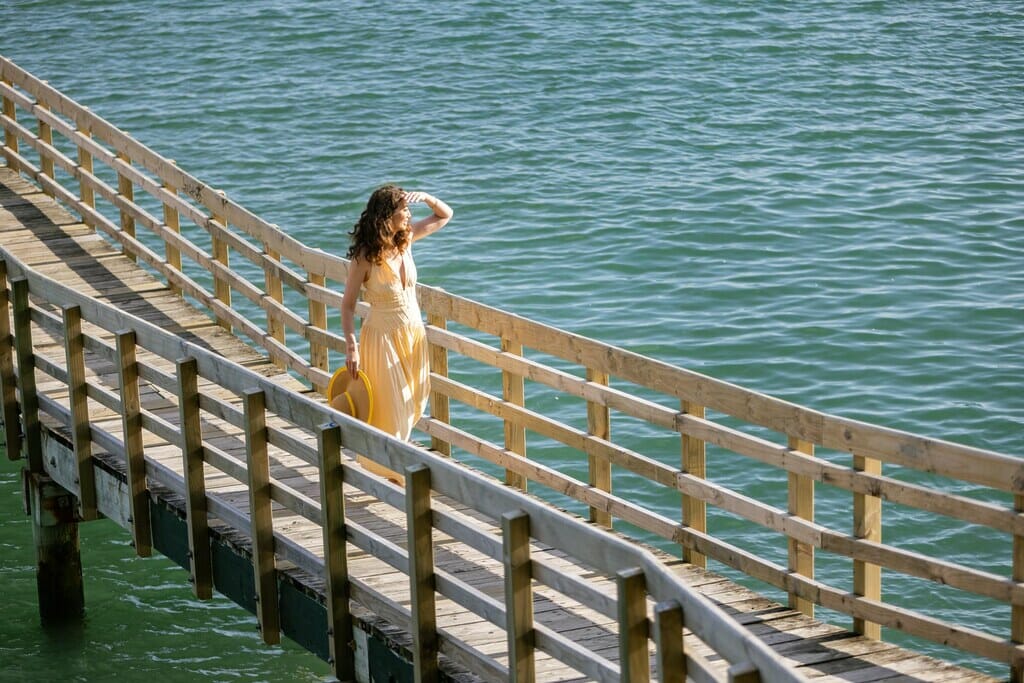
Forward to 50
In the meantime, there is still much to do – and much to be optimistic about.
“I’m looking forward to turning 50. It seems to be a magical age.” She’s predicting, optimistically, that by then, all her menopause symptoms will mysteriously disappear, and everything will become clear.
“I’m not afraid of getting older. I may as well step into it and be grateful. I’m lucky, and there is a responsibility to ensure others have fulfilling lives. I mentor a lot of young journalists. I know what it’s like in this industry as a Māori woman.”
She’s also intent on furthering understanding of Aotearoa’s culture – all of it. “For so long, we’ve been denied the whole story. We’ve only heard half of it. We’ve got such a rich and beautiful history.” Her parents, both prison chaplains, raised their children in te ao Māori, but also made them aware of their Irish and Scottish heritage.
Miriama, meanwhile, has another four children’s books coming out, plus she and husband Mike are part of Kotahi Rau Pukapuka, which produces translated versions of popular books for middle readers. “We’ve had seven books come out, and another 10 next year. We want to get to 100, so we’re always hustling for money. We decided the books had to be the highest standard of te reo, and we’ve been able to use the best translators in the country. That’s been really exciting.”
She’s also on the boards of the Arts Foundation and Save the Kiwi, an ambassador for Pillars (supporting children of those in prison) and Endometriosis New Zealand, and patron of New Zealander of the Year.
Thanks to her lifestyle changes, she’s also feeling rather good. “Getting rid of the back pain was nothing short of a miracle. I feel much more connected and grateful,” she says. “And probably more preachy,” she adds, with a wry grin.
“And I recommend the one-month ridiculous challenge.” The dares, which started as goals, have morphed into something long-term, meaningful and, in the end, not so difficult. Although she has one that she admits might take decades, rather than months, or even years, to achieve. “I want to learn to do the splits,” she says. Given her track record, you wouldn’t bet against it.
PHOTOGRAPHY: REUBEN LOOI

